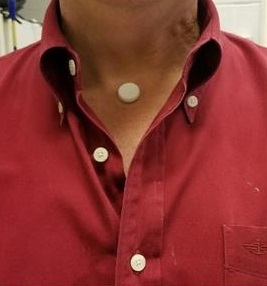Villanova Engineering Professor Partners with RTM Vital Signs, LLC, to Develop a Wearable COVID-19 Monitoring System for Patients
An acoustic sensor attached to one’s tracheal notch will alert healthcare team via mobile phone app.

VILLANOVA, Pa.—A professor at Villanova University’s College of Engineering is developing an accurate, easy-to-use technology to monitor at-risk individuals, including seniors, for early signs of COVID-19—before the infection progresses to a dangerous and potentially irreversible degree.
Moeness Amin, PhD, Director of the Center for Advanced Communications in Villanova’s College of Engineering, has partnered with Philadelphia-based firm RTM Vital Signs, LLC to develop a full monitoring system that consists of an integrated sensor and smartphone application. The acoustic sensor is attached to an individual’s tracheal notch, and when the person breathes, the sensor measures the acoustic sounds as the air goes out and in through the trachea.
“Instead of measuring breathing through the lungs, it is more informative from a data analysis and classification perspective to assess respiratory conditions by acquiring the signals through the tracheal notch,” explains Dr. Amin.
Dr. Amin’s project is one of two Villanova Engineering initiatives that were among seven projects awarded funding through the Manufacturing PA Innovation Program COVID-19 Challenge to address the commonwealth’s response to the COVID-19 pandemic. Dr. Amin received $24,802 towards improving and implementing, in real time, an effective machine learning technique that is fundamental to the functioning of the overall sensor. The main sensor features are as follows:
- The sensor accurately measures the individual’s temperature, heart rate, oxygen saturation and tracheal sound.
- The mobile device receives these data wirelessly, via Bluetooth, and through an app, executes effective signal processing algorithms and machine learning techniques to extract the minute ventilation and classify the individual’s breathing conditions and disorders.
- The app computes a risk-index-score that produces a series of alerts/alarms (visual, auditory, and vibratory) that warn the patient and/or medical professional of worsening pulmonary function.
In Pennsylvania, approximately 70 percent of the COVID-19-related deaths have occurred in residents at nursing or personal care homes. “In many cases, by the time an individual becomes aware of and recognizes any single, or multiple COVID-19 symptoms, they are already in danger of permanent health damage or death,” says Dr. Amin. “We are trying to help solve a really big problem.”
Dr. Amin notes that the sensor design predicates on the same principal ideas as the one also being developed by RTM for opioid overdose detection using the acoustic sensing modality. Although both sensors address the person’s respiratory conditions, the COVID-19 sensor includes temperature and oxygen saturation markers that underlie the infection. RTM’s CEO and co-founder, Dr. Nance Dicciani ’69, is a graduate of Villanova’s College of Engineering and a former member of the University’s Board of Trustees. Denise L. Devine, also a co-founder of RTM and CFO of the company, is a 1977 graduate of the Villanova School of Business, and also served on the Board of Trustees of the University.
The monitoring device can be used at homes, clinics, and hospitals and would send alerts in real-time to first responders, doctors, nurses, family members or caretakers if the person develops any of the COVID-19 symptoms: high temperature, difficulty breathing, decreased oxygen level. The device will also make the person aware of any development of abnormal signs.
Smaller than a quarter, the sensor can be securely adhered to the skin so the sensor will not drop off or shift in position while talking or eating. The sensor is slated to be available within a few months and will be prescribed via a patient’s physician.
About Villanova University: Since 1842, Villanova University’s Augustinian Catholic intellectual tradition has been the cornerstone of an academic community in which students learn to think critically, act compassionately and succeed while serving others. There are more than 10,000 undergraduate, graduate and law students in the University's six colleges—the College of Liberal Arts and Sciences, the Villanova School of Business, the College of Engineering, the M. Louise Fitzpatrick College of Nursing, the College of Professional Studies and the Villanova University Charles Widger School of Law. Ranked among the nation’s top universities, Villanova supports its students’ intellectual growth and prepares them to become ethical leaders who create positive change everywhere life takes them. For more, visit www.villanova.edu.
